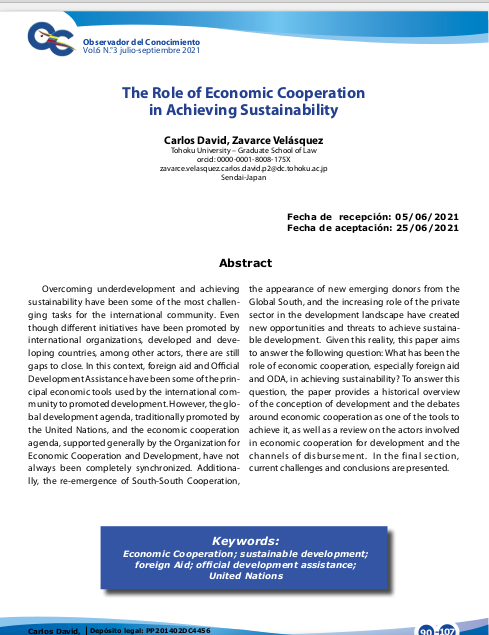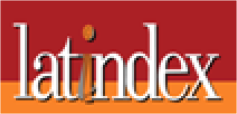The Role of Economic Cooperation in Achieving Sustainability
Keywords:
Economic Cooperation, sustainable development, foreign Aid, official development assistance, United NationsAbstract
Overcoming underdevelopment and achieving sustainability have been some of the most challenging tasks for the international community. Even though different initiatives have been promoted by international organizations, developed and developing countries, among other actors, there are still gaps to close. In this context, foreign aid and Official Development Assistance have been some of the principal economic tools used by the international community to promoted development. However, the global development agenda, traditionally promoted by the United Nations, and the economic cooperation agenda, supported generally by the Organization for Economic Cooperation and Development, have not always been completely synchronized. Additionally, the re-emergence of South-South Cooperation, the appearance of new emerging donors from the Global South, and the increasing role of the private sector in the development landscape have created new opportunities and threats to achieve sustainable development. Given this reality, this paper aims to answer the following question: What has been the role of economic cooperation, especially foreign aid and ODA, in achieving sustainability? To answer this question, the paper provides a historical overview of the conception of development and the debates around economic cooperation as one of the tools to achieve it, as well as a review on the actors involved in economic cooperation for development and the channels of disbursement. In the final section, current challenges and conclusions are presented.
Downloads
References
Asplund, A. & Soderberg, M. (2017). Japanese Development Cooperation: The Making of an Aid Architecture Pivoting to Asia. Routledge.
Bergamaschi, I. & Tickner, A. (2017). South-South Cooperation Beyond the Myths: Rising Donors, New Aid Practices?. Palgrave Macmillan.
Brundtland Commission. (1987). Our Common Future. The United Nations and Cambridge University Press.
Coate, R. ‘Sustainable Development Governance’ in Thomas Weiss and Rorden Wilkinson (eds.) From International Organization and Global Governance, 2nd ed. London Routledge, 2018.
Deaton, A. (2013). The Great Escape: Health, Wealth, and the Origins of Inequality. Princeton University Press.
Dollar, D. & Pritchett, L. (1998). Assessing Aid: What Works, What Doesn’t and Why. World Bank Policy Research Report. Oxford University Press. New York
Easterly, W. (2006). The white man's burden: why the West's efforts to aid the rest have done so much ill and so little good. New York: Penguin Press.
Esteban, M. & Pérez, A. (2017). Chinese financing of Latin American development: Competition or complementarity with traditional donors?, in Eckart Woertz (ed.), Reconfiguration of the Global South: Africa, Latin America and the Asian Century, Nueva York: Routledge: 217-236. ISBN: 978-1-85743-863-5-
García, J. (2020). Hacia una nueva cooperacion post-pandemia. CAF Banco de Desarrollo de America Latina.
Gomez, O. (2019). Humanitarian Crises and the Rise of the Rest: The Future of Humanitarianism from the Perspective of Four Latin American Emerging Countries. JICA Research Institute.
Hirst, M. (2010). America Latina y la Cooperación Sur-Sur: Reflexiones Conceptuales y Politicas. In Ayllon, B & Surasky, J. (2010). La Cooperacion Sur-Sur en America Latina: Utopia y Realidad. Universidad Complutense de Madrid.
Hynes, W. & S. Scott. (2013). The Evolution of Official Development Assistance: Achievements, Criticisms and a Way Forward. OECD Development Co-operation Working Papers, No. 12, OECD Publishing.
Hulme, D. (2009). The Millennium Development Goals (MDGs): A Short History of the World’s Biggest Promise. BWPI Working Paper 100. The University of Manchester.
International Peace Institute. (2009). Underdevelopment, Resource Scarcity, and Environmental Degradation. IPI Blue Papers. New York.
Japan International Cooperation Agency. (2021). Japan's ODA and JICA. URL: https://www.jica.go.jp/english/about/oda/index.html (Visited: July 20, 2021).
Kragelund, P. (2019). South-South Development. Routledge.
Lancaster, C. (2007). Foreign Aid: Diplomacy, Development, Domestic Policy. The University of Chicago Press.
Manning, R. (2006). Will Emerging Donors Change the Face of International Cooperation? Development Policy Review.
Ministry of Foreign Affairs of Japan. (1994). History of Official Development Assistance. URL: https://www.mofa.go.jp/policy/oda/summary/1994/1.html (Visited: July 31st, 2021).
Naim, M. (2007). Rogue Aid. Foreign Affairs.
Organization for Economic Cooperation and Development. (2021). Official Development Assistance (ODA). Paris, France.
Osili, U. (2014). Private Aid and Development: Evidence from Million Dollar Donations. Indiana University Purdue University Indianapolis.
Potter, D. (2015). “Changing Roles for Japan's Official Development Assistance in Latin America and the Caribbean. Nanzan University.
Quadir, F. (2013). Rising Donors and the New Narrative of ‘South–South’ Cooperation: what prospects for changing the landscape of development assistance programmes?, Third World Quarterly, 34:2, 321-338.
Sachs, J. (2005). The end of poverty: economic possibilities for our time. UK. - New York: Penguin Press.
Schmassmann, E. (2017). 2030 Agenda: universal reference framework for sustainable development. Swiss Peace Foundation.
Trinity College Dublin. (2021). Are the Sustainable Development Goals the Best Approach to Sustainability? The University of Dublin. URL: https://www.futurelearn.com/info/courses/achieving-sustainable-development/0/steps/35496 (Visited: August 2, 2021).
United Cities and Local Governments Asia Pacific. (2021). NORTH – SOUTH COOPERATION. URL: https://uclg-aspac.org/en/what-we-do/decentralized-cooperations/north-south-cooperation/ (Visited: July 17, 2021).
United Nations (1960). Resolution 1701(XVI) - 1st UN Development Decade. New York.
United Nations. (2021). United Nations Conference on Environment and Development, Rio de Janeiro, Brazil, 3-14 June 1992. URL: https://www.un.org/en/conferences/environment/rio1992 (Visited: July 13th, 2021).
United Nations. (2013). A New Global Partnership: Eradicate Poverty and Transform Economies Through Sustainable Development -The Report of The High-Level Panel of Eminent Persons on the Post-2015 Development Agenda”. New York.
United Nations, (2015). Resolution 70/1, Transforming Our World: the 2030 Agenda for Sustainable Development. New York.
United Nations, (2019). The Sustainable Development Goals Report 2019. New York.
United Nations Department of Economic and Social Affairs. (2015). Financing sustainable development and developing sustainable finance. New York.
United Nations Department of Economic and Social Affairs. (2019). “What is ‘South-South cooperation’ and why does it matter?”. New York.
United Nations Office for South South Cooperation, (2021). About South-South and Triangular Cooperation. URL: https://www.unsouthsouth.org/about/about-sstc/ (Visited, June 1st, 2021).
Yamada, K. (2011). Case Studies In Capacity Development in Power Sector With South-South Cooperation Components. Japan International Cooperation Agency. Japan.
Zhang Qiang, B. (2021, July 29th). The Strategic Value of Development Cooperation [Conference presentation]. Public Diplomacy in Asia 2021. Singapore International Foundation.

Downloads
Published
How to Cite
Issue
Section
License

This work is licensed under a Creative Commons Attribution-NoDerivatives 4.0 International License.







